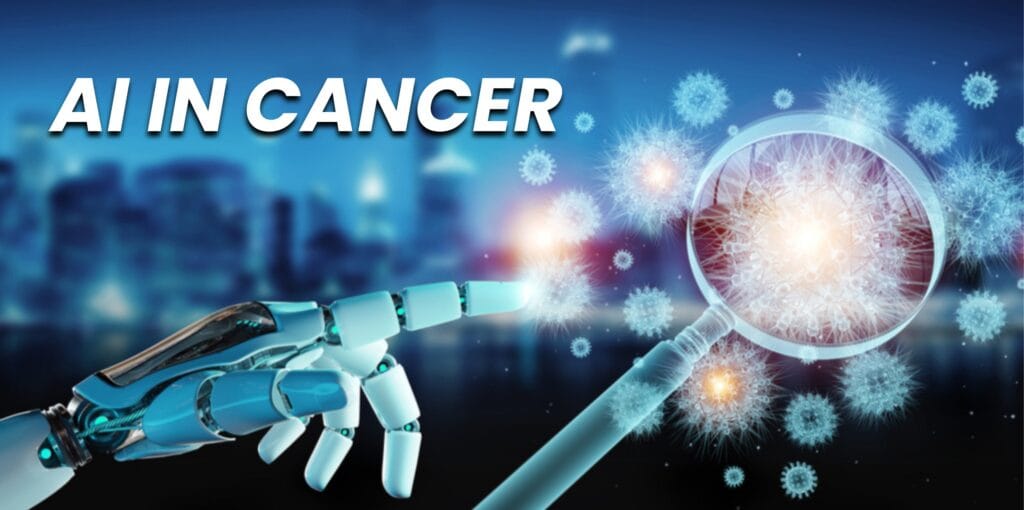AI in Cancer

Artificial Intelligence (AI) is revolutionizing many fields, and oncology is no exception. The integration of AI in cancer research, diagnosis, and treatment is opening new avenues for improving patient outcomes and advancing our understanding of this complex disease. This blog explores the various ways AI is being utilized in the fight against cancer and its potential to transform oncology.
AI in Cancer Detection
One of the most promising applications of AI in cancer is in the early detection and diagnosis of the disease. AI algorithms can analyze medical images, such as mammograms, CT scans, and MRIs, with remarkable accuracy. These algorithms are trained to recognize patterns and anomalies that may be too subtle for the human eye to detect1.
For instance, AI tools have been developed to detect breast cancer in mammograms with a higher accuracy rate than human radiologists2. Similarly, AI systems are being used to identify lung nodules in CT scans, which can be indicative of lung cancer. Early detection is crucial in cancer treatment, as it significantly improves the chances of successful treatment and survival.
AI in Cancer Treatment
AI is also playing a pivotal role in personalizing cancer treatment. By analyzing vast amounts of data from clinical trials, patient records, and genetic information, AI can help oncologists develop tailored treatment plans for individual patients. This approach, known as precision medicine, aims to provide the most effective treatment based on the unique characteristics of each patient’s cancer3.
One notable example is the use of AI to predict how patients will respond to specific treatments. Machine learning algorithms can analyze data from previous patients to identify patterns and predict outcomes, helping doctors choose the best course of action. This not only improves the effectiveness of treatments but also reduces the risk of adverse side effects.
AI in Drug Discovery
The process of discovering new cancer drugs is time-consuming and expensive. However, AI is streamlining this process by identifying potential drug candidates more quickly and accurately. AI algorithms can analyze chemical structures and predict their interactions with cancer cells, significantly speeding up the drug discovery process4.
For example, AI has been used to identify new compounds that can inhibit the growth of cancer cells. These compounds can then be tested in the lab, accelerating the development of new cancer therapies. This approach has the potential to bring new treatments to market faster, providing patients with more options.
AI in Cancer Research
AI is also transforming cancer research by enabling scientists to analyze large datasets more efficiently. Researchers can use AI to identify new biomarkers for cancer, understand the genetic mutations that drive the disease, and explore the mechanisms of cancer progression5.
One exciting area of research is the use of AI to simulate the behavior of cancer cells. By creating virtual models of cancer cells, scientists can study how they grow and spread, leading to new insights into the disease. This knowledge can then be used to develop more effective treatments and prevention strategies.
Challenges and Future Directions
While the potential of AI in cancer is immense, there are still challenges to overcome. One major challenge is the need for large, high-quality datasets to train AI algorithms. Ensuring patient privacy and data security is also a critical concern.
Moreover, the integration of AI into clinical practice requires collaboration between technologists, clinicians, and researchers. It is essential to validate AI tools through rigorous clinical trials to ensure their safety and effectiveness.
Despite these challenges, the future of AI in cancer looks promising. Ongoing research and technological advancements are likely to further enhance the capabilities of AI in oncology. As AI continues to evolve, it has the potential to revolutionize cancer care, improving early detection, treatment outcomes, and ultimately, patient survival.
Conclusion
The integration of AI in cancer research, detection, and treatment is transforming the field of oncology. From early detection and personalized treatment to drug discovery and cancer research, AI is providing new tools and insights that are improving patient outcomes. While challenges remain, the future of AI in cancer care is bright, offering hope for more effective treatments and better survival rates.
As we continue to harness the power of AI, we move closer to a future where cancer can be detected earlier, treated more effectively, and ultimately, cured.
References: 1: Harvard Gazette. “New AI tool can diagnose cancer, guide treatment, predict patient survival.” 2: NCI. “AI and Cancer.” 3: ABC News. “How artificial intelligence is being used to detect, treat cancer.” 4: Ezra. “Current and Future Applications of AI in Cancer Treatment.” 5: Nature. “How AI is improving cancer diagnostics.”

Dr. A. Venugopal
Clinical Director & HOD Medical Oncology Senior Consultant Medical Oncologist & Hemato-Oncologist
About Author
Dr. A. Venugopal
MD (General Medicine), DM (Medical Oncology), MRCP – SCE Medical Oncology (UK), ECMO (Switzerland).
Dr A. Venugopal is One of the best medical oncologist and Hemato Oncologist in hyderabad, currently serving as the Head of the Department and Senior Medical Oncologist, Hemato Oncologist at Pi Health Cancer Hospital in Gachibowli, Hyderabad. He brings over 15 years of extensive experience in the field of Oncology.
